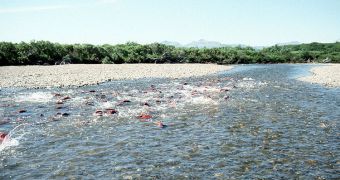As climate change is beginning to stack up its pressure on fisheries worldwide, conservation experts are turning to all possible sources of inspiration, in hopes of figuring out how to handle this delicate situation. Apparently, ancient history has a lot to teach us in that regard.
In a paper published in the March 23 issue of the journal Fish and Fisheries, experts say that the past is indeed a great source of data for how to handle fisheries in a sustainable manner, so as to ensure that populations do not collapse.
Overfishing is one of the main problems we have today. Most fisheries are being exploited well beyond sustainable limits, which means that their populations can no longer return to their previous levels even if we stop what we're doing right now.
For these fisheries, it is already too late to interfere. However, there are still some populations that have yet to reach that threshold, and those could benefit significantly from a change in our standard approach to fishing, analysts believe.
In the new study, experts from the Center for Ocean Solutions at Stanford University managed to reconstruct fishery yields over the past 700 years, in areas around Hawaii and the Florida Keys.
These two locations are home to the largest coral reef ecosystems in the United States, and provide an exquisite test bed for assessing the efficiency of old management strategies. The team was especially interested in how ancient fishermen kept fish populations at sustainable levels.
“Before European contact, Native Hawaiians were catching fish at rates that far exceed what reefs currently provide society. These results show us that fisheries can be both highly productive and sustainable, if they're managed effectively,” explains COS early career fellow John N. Kittinger.
In Florida, the situation was not that rosy. Species such as green turtles, sawfish, conch and groupers are currently nearly depleted, or threatened with extinction, due to extremely intensive exploitation in the 19th and early-20th centuries.
“Seven hundred years of history clearly demonstrate that management matters,” explains Colby College assistant professor of environmental studies, Loren McClenachan. She was also a coauthor of the new research paper.
“Ancient Hawaiian societies used sophisticated tools similar to innovative conservation strategies used today, like marine protected areas and restrictions on harvest of vulnerable species like sharks,” McClenachan concludes, quoted by e! Science News.

 14 DAY TRIAL //
14 DAY TRIAL //